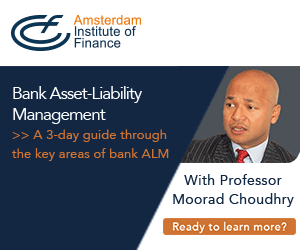Professor Moorad Choudhry’s program Bank Asset-Liability Management (ALM) at Amsterdam Institute of Finance will empower participants with a practical understanding of ALM and the ability to develop a framework to implement this discipline within the banks in which they operate.
Professor Moorad Choudhry says that in the wake of the Covid-19 pandemic, he’s suggesting banks begin to consider a “flight simulator” approach to risk management and stress testing. People studying for their pilot’s licence experience this type of training, in which the examiner will simulate an emergency, based on a range of possible scenarios and parameters.
“You don’t know what’s going to happen; it’s suddenly there in front of you and you’ve got to deal with it straight away,” he says. “I think banks need to have a more flexible and adaptable risk management and stress testing framework like this so that they can be assured that their framework is indeed fit for purpose in dealing with short-notice unexpected stress events.”
He intends that his Bank Asset-Liability Management course, being presented from 7 to 9 June 2021 at the Amsterdam Institute of Finance, will equip anyone who’s working in any aspect of balance sheet risk management to help develop these kinds of frameworks, and to grow a deep and practical understanding of ALM and how to apply it within their own bank.
Moorad is an independent non-executive director at Recognise Bank in London and at the Loughborough Building Society, and the author of The Principles of Banking. Previously, he was treasurer at the Corporate Banking Division at The Royal Bank of Scotland, head of treasury at Europe Arab Bank, global head of treasury at KBC Financial Products, vice president in structured finance services at JPMorgan Chase and a gilt-edged market maker at ABN Amro Hoare Govett Ltd. Moorad holds an MBA from Henley Business School and a PhD from Birkbeck, University of London.
Practical perspective
“The idea behind the Bank ALM course is to understand the discipline in full from a practical perspective, so that you are now comfortable discussing all ALM matters at your asset-liability committee (ALCO) and in the future, even at another bank, even for areas not connected with your day job,” he says. “My hope is that participants come away with knowledge of potential solutions, but also being able to apply their own judgment in selecting the solution that best fits their bank and specific situation. And there is always more than one potential solution to any problem.”
He emphasizes that banks are not all alike. “Banks are different creatures doing different things with different types of customers, products, business models, and operating structures. You need to be able to apply ALM learnings and adapt them to your own surroundings,” he says. “There isn’t a one-size-fits-all. There’s usually more than one right answer. The same solution will not be ideal for every bank.”
Knowledge sharing
He likens teaching bank ALM to the experience required in order to qualify as a hospital consultant – it’s not a role someone can step into without having a fair amount of practical experience to draw from across different types of institutions. Having worked in various banks across several countries and with 24 years of teaching experience, Moorad understands this better than most. “I choose to teach because I’m a big believer in knowledge transfer,” he says. “I’m 100 percent against this idea that everything is top secret in a bank. It amuses me somewhat when you see all this ‘proprietary to us’ thinking. There are other banks on the same road as you, selling the same products as you.”
He believes that sharing different approaches is important for benchmarking and developing best practice. “You tell me how you do ALM, and I may change my view, or you might change your view based on me telling you how I do it. I think the industry should embrace knowledge sharing. The more people know about how other people do things, the better it’ll inform our judgment.”
Interacting with peers from other banks during this course will allow participants to benefit not just from Moorad’s experience, theoretical lessons and practical input, but also to learn from one another, particularly through group exercises and case studies.
Moorad believes this kind of knowledge sharing is particularly important in the era of Basel III, with banks needing to work towards balance sheet optimization in order to satisfy the demands of multiple stakeholders, from regulators to customers and shareholders. “Efficient and effective ALM practice is the primary part of this process,” he says.
Participants can expect to learn about integrated ALM origination framework, capital management, liquidity risk management, Funds Transfer Pricing (FTP) and interest rate risk in the banking book (IRRBB). “We’ll address the challenge of implementing an efficient regulatory submissions process (ICAAP and ILAAP), to ensure that a bank is able to implement best-practice processes, and look at the challenge of meeting the requirements of all stakeholders involved,” says Moorad.
Prof. Moorad Choudhry teaches the Bank Asset-Liability Management program at Amsterdam Institute of Finance (AIF).
